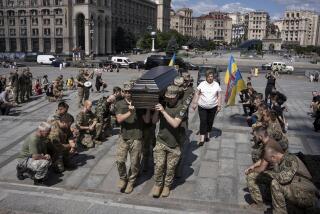A Shard of Hope in a Shattered Capital
- Share via
POSYOLOK KIROVA, Russia — Squatting in the mud, ragged villagers just outside the embattled capital of Chechnya stared up, expressionless, at two Russian bombers circling overhead Tuesday. A few miles behind them, the crash of heavy artillery started again from the city center, shrouded in dark smoke. With a deafening roar, the planes dropped their bombs on a residential neighborhood.
“They’re shooting at refugees,” said Lt. Col. Isa Sholkhalov, an officer in the separatist rebel army. “The Russians won’t let people get away [from the city]. Basically they’re tracking civilians and bombing them.”
Since the rebels humiliated the Russian army by overrunning Grozny a week ago, the capital has been convulsed by one of the heaviest weeks of fighting in 20 months of war.
On Tuesday evening, the Russian and separatist commanders agreed to a new cease-fire starting at noon today. But it is far from certain that the truce will bring much more than a brief respite to the two armies and the tens of thousands of civilians trapped between them.
The accord grew from a secret overnight trip to the embattled southern republic made by Russian security chief Alexander I. Lebed in a desperate attempt to end the rebel occupation of a city nominally controlled by Moscow.
Reports of the agreement by Russian television and news agencies said the two armies are to pull back their fighters and exchange dead and wounded. It was unclear whether the cease-fire is to be temporary or indefinite or whether the rebels are obliged to withdraw from Grozny.
If a truce takes hold, it would at least allow tens of thousands of terrorized civilians to crawl out of the city’s basements, where they have been trapped for a week with dwindling supplies of food, water and medicine.
On Tuesday, the rebels kept up their attacks on government buildings while Russian forces pounded the city from helicopter gunships and tanks and with artillery guns--some of their fire apparently aimed at people trying to flee.
Rebel spokesman Movladi Udugov told Russian television that the pact calls for “humanitarian corridors” to let civilians into and out of Grozny, a half-ruined urban sprawl with a prewar population of 400,000 at the foot of the Caucasus Mountains.
International aid agencies have been pleading for safe passage to get relief to wounded civilians who have jammed Grozny’s hospitals.
Casualties are unknown but believed to run in the thousands; at least 200 Russian soldiers have been reported killed in a week of fighting.
The war has claimed more than 30,000 lives.
The conflict has been halted twice by relatively effective cease-fires--once last summer after rebels staged a daring terrorist raid on the Russian city of Budennovsk and again in late May to help ensure Russian President Boris N. Yeltsin’s reelection.
Both cease-fires broke down over the intractable issue of Muslim-led Chechnya’s claim of independence from Moscow.
Separatist fighters swarmed into Grozny on Aug. 6, a year and a half after they first abandoned it to the invading Russian army. They have encircled Russian military bases, overrun part of the Federal Security Service complex and burned down the headquarters of the pro-Moscow puppet government.
“Our fighters now basically control the whole city,” Sholkhalov, the rebel officer, said here on Grozny’s outskirts as he adjusted his green velvet beret and headed back into town with a truckload of fighters. He said Russian forces were still firmly established only at Grozny’s airport and at their main base just east of the city.
Trudging away from the burning city to the rolling lowlands and a day’s rest, a separatist fighter who identified himself only as Roma said with grim satisfaction that about 1,000 Russian soldiers at the checkpoint near the city center were surrounded and “dropping dead like flies from starvation.”
Late Sunday, Lebed traveled secretly to Chechnya in an attempt to stop the fighting.
Returning to Moscow on Monday, he announced that he and the rebel commander, Gen. Aslan Maskhadov, had agreed on the need for a truce and new peace talks.
The cease-fire accord grew out of follow-up talks Tuesday between Maskhadov and Russia’s acting commander in Chechnya, Gen. Konstantin Pulikovsky, at a Russian military post about 15 miles south of Grozny.
On Tuesday, refugees packed into cars and ramshackle trucks slithered through the thick mud of a road leading out of Grozny, one of the only paths without a Russian checkpoint.
Shamsudin Uchigov, escaping in relative luxury in a crowded jeep, sneaked away from his Grozny home during a midmorning lull in the shelling and bombing. He said frantic Russian soldiers at a military base near his home had rounded up Chechen civilians Monday night to use as hostages.
At least 5,000 people have left Grozny on an indirect but relatively peaceful route, taking them to safety in the neighboring Russian republic of Ingushetia, aid workers say.
Idris Toriyev, head of Ingushetia’s overworked Migration Service, said he expects at least 40,000 people to follow as soon as they can get out of Grozny.
“The result would be disaster” for Ingushetia, he said. One-third of Ingushetia’s population of 500,000 is already made up of refugees, and the impoverished region has little room and no money for more.
“We’re not getting a single kopeck to finance looking after them,” Toriyev said. “We are supplying them with whatever we can, but we are so desperate we’ve even been asking our friends to put them up.”
Times staff writer Richard Boudreaux in Moscow contributed to this report.
More to Read
Sign up for Essential California
The most important California stories and recommendations in your inbox every morning.
You may occasionally receive promotional content from the Los Angeles Times.













